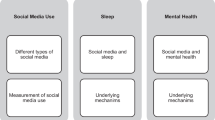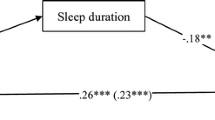Abstract
Data on sleep behavior were gathered on 100 children with pervasive developmental disorders (PDD), ages 2–11 years, using sleep diaries, the Children's Sleep Habits Questionnaire (CSHQ), and the Parenting Events Questionnaire. Two time periods were sampled to assess short-term stability of sleep–wake patterns. Before data collection, slightly more than half of the parents, when queried, reported a sleep problem in their child. Subsequent diary and CSHQ reports confirmed more fragmented sleep in those children who were described by their parents as having a sleep problem compared to those without a designated problem. Interestingly, regardless of parental perception of problematic sleep, all children with PDD exhibited longer sleep onset times and greater fragmentation of sleep than that reported for age-matched community norms. The results demonstrate that sleep problems identified by the parent, as well as fragmentation of sleep patterns obtained from sleep diary and CSHQ data, exist in a significant proportion of children with PDD.
Similar content being viewed by others
REFERENCES
American Psychiatric Association. (1994). Diagnostic and Statistical Manual of Mental Disorders (4th ed.). Washington, DC: Author.
Bernal, J. (1973). Night waking in infants during the first 14 months. Developmental Medicine and Child Neurology, 15(6), 362–372.
Blader, J. C., Koplewicz, H. S., Abikoff, H., & Foley, C. (1997). Sleep problems of elementary school children. Archives of Pediatrics and Adolescent Medicine, 151(5), 473–480.
Crnic, K. A., & Greenberg, M. T. (1990). Minor parenting stresses with young children. Child Development, 61, 1628–1637.
DeMeyer, M. K. (1979). Parents and Children in Autism. New York: Wiley.
Ferber, R. (1995) Circadian rhythm sleep disorders in childhood. In R. Ferber & M. Kryger (Eds.), Principles and Practice of Sleep Medicine in the Child (pp. 91–105). Philadelphia: WB Saunders.
Gruber, R., Sadeh, A., & Raviv, A. (2000). Instability of sleep patterns in children with attention-deficit / hyperactivity disorder. Journal of the American Academy of Child & Adolescent Psychiatry, 39(4), 495–501.
Hering, E., Epstein, R., Elroy, S., Iancu, D. R., & Zelnik, N. (1999). Sleep patterns in autistic children. Journal of Autism and Developmental Disorders, 29(2), 143–147.
Hoshino, Y., Watanabe, H., Yashima, Y., Kaneko, M., & Kumashiro, H. (1984). An investigation on sleep disturbance of autistic children. Folia Psychiatrica et Neurologica, 38(1), 45–61.
Inanuma, K. (1984). Sleep-wake patterns in autistic children. Japanese Journal of Child & Adolescent Psychiatry, 25(4), 205–217.
Johnson, C. R. (1996). Sleep problems in children with mental retardation and autism. Child and Adolescent Psychiatric Clinics of North America, 5(3), 673–683.
Klackenberg, G. (1982). Sleep behaviour studied longitudinally: Data from 4–6 years on duration, night-awakening, and bed sharing. Acta Paediatrica Scandinavica, 71, 501–506.
Konstantareas, M. M., & Homatidis, S. (1989). Assessing child symptoms severity and stress in parents of autistic children. Journal of Child Psychology and Psychiatry, 30, 459–470.
Norton, P., & Drew, C. (1994). Autism and potential family stressors. American Journal of Family Therapy, 22(1), 67–76.
Owens, J. A., Spirito, A., McQuinn, M. (2000). The children's sleep habits questionnaire: Psychometric properties of a survey instrument for school-aged children. Sleep, 23(8), 1043–1051.
Patzold, L. M., Richdale, A. L., & Tonge, B. J. (1998). An investigation into sleep characteristics of children with autism and asperger's disorder. Journal of Paediatrics and Child Health, 34(6), 528–533.
Quine, L. (1991). Sleep problems in children with mental handicap. Journal of Mental Deficiency Research, 35, 269–290.
Rapin, I., & Katzman, R. (1998). Neurobiology of autism. Annals of Neurology, 43, 7–14.
Richdale, A. L. (1999). Sleep problems in autism: Prevalence, cause, and intervention. Developmental Medicine & Child Neurology, 41(1), 60–66.
Richdale, A. L., & Prior, M. R. (1995). The sleep/wake rhythm in children with autism. European Child & Adolescent Psychiatry, 4(3), 175–186.
Richman, N. (1981a). Sleep problems in young children. Archives of Disease in Childhood, 56, 491–493.
Richman, N. (1981b). A community survey of characteristics of 1– 2 years olds with sleep disruption. Journal of the American Academy of Child Psychiatry, 26, 281–291.
Schreck, K. A., & Mulick, J. A. (2000). Parental reports of sleep problems in children with autism. Journal of Autism and Developmental Disorders, 30(2), 127–135.
Segawa, M., Katoh, M., Katoh, J., & Nomura, Y. (1992). Early modulation of sleep parameters and it's importance in later behavior. Brain Dysfunction, 5, 211–223.
Stores, G. (1992). Sleep studies in children with a mental handicap. Journal of Child Psychology & Psychiatry & Allied Disciplines, 33(8), 1303–1317.
Taira, M., Takase, M., & Sasaki, H. (1988). Sleep disorder in children with autism. Psychiatry and Clinical Neurosciences, 52(2), 182–183.
Takase, M., Taira, M., & Sasaki, H. (1988). Sleep-wake rhythm of autistic children. Psychiatry and Clinical Neurosciences, 52(2), 181–182.
Van Bourgondien, M. E. (1993). Behavior management in the preschool years. In E. Schopler (Ed.), Preschool Issues in Autism (pp. 129–45). New York: Plenum.
Vela-Bueno, A. K., Kales, A., Soldatos, C. R., Dobladez-Blanco, B., Campos-Castello, J., Espino-Hurtado, P., & Olivan-Palacios, J. (1984). Sleep in Prader-Willi syndrome: Clinical and polygraphic findings. Archives of Neurology, 41(3), 294–296.
Wolke, D. M., Meyer, R., Ohrt, B., & Riegel, K. (1995). The incidence of sleeping problems in preterm and fullterm infants discharged from neonatal special care units: An epidemiological longitudinal study. Journal of Child Psychology & Psychiatry & Allied Disciplines, 36(2), 203–223.
Author information
Authors and Affiliations
Rights and permissions
About this article
Cite this article
Honomichl, R.D., Goodlin-Jones, B.L., Burnham, M. et al. Sleep Patterns of Children with Pervasive Developmental Disorders. J Autism Dev Disord 32, 553–561 (2002). https://doi.org/10.1023/A:1021254914276
Issue Date:
DOI: https://doi.org/10.1023/A:1021254914276




